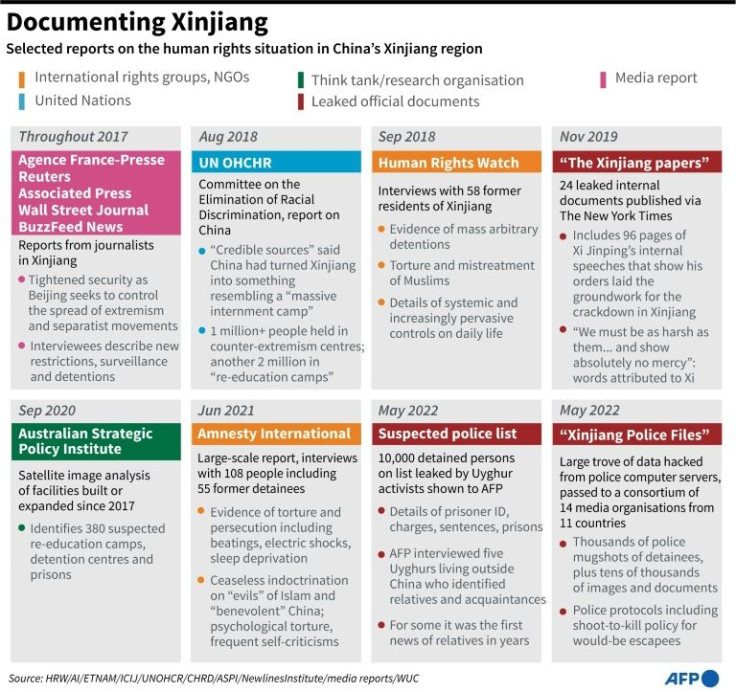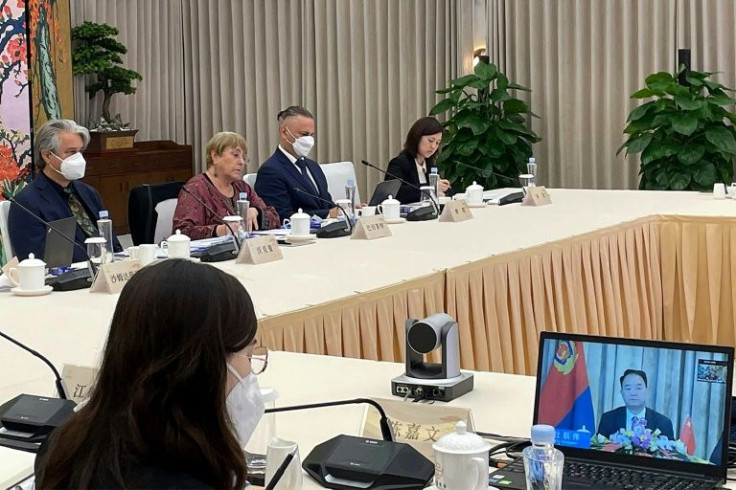Xi Speaks With UN Rights Chief As Xinjiang Row Rages
Chinese President Xi Jinping held a video call with UN rights chief Michelle Bachelet on Wednesday, as she visits Xinjiang during a mission overshadowed by fresh allegations of Uyghur abuses and fears she is being used as a public relations tool.
China's Communist Party is accused of detaining over one million Uyghurs and other Muslim minorities in the far-western region as part of a years-long crackdown the United States and lawmakers in other Western countries have labelled a "genocide".
Bachelet is expected to visit the cities Urumqi and Kashgar on a six-day tour that has been dogged by concerns from Western officials, diplomats and rights groups that the Communist Party will attempt to use it to whitewash abuses.

China vehemently denies the abuse allegations, calling them the "lie of the century".
The United States has reiterated its view that Bachelet's visit was a mistake after the release of thousands of leaked documents and photographs from inside the system of mass incarceration this week.
And activists have voiced concern that Beijing will prevent Bachelet from conducting a thorough probe into alleged rights abuses and instead give her a stage-managed tour.

But Xi defended his country's human rights progress during the video call, according to a readout from state broadcaster CCTV, which did not say whether Xinjiang was mentioned by either side.
"Human rights issues should also not be politicised, instrumentalised, or treated with double standards," Xi said according to CCTV, adding that China had "a human rights development path that... suits its national conditions".
CCTV reported Xi as telling Bachelet there was no "ideal nation" on human rights and that there was "no need for a 'teacher' who is bossy towards other countries" -- an apparent reference to recent criticisms of the trip by US and British officials.

According to the CCTV readout, Bachelet said the UN Human Rights Office was "willing to strengthen cooperation with the Chinese side".
She was also reported to have said: "I admire China's efforts and achievements in eradicating poverty, protecting human rights, and realising economic and social development."
Bachelet's spokesperson did not confirm the state media comments to AFP, but said the high commissioner told Xi she hoped her office could "accompany efforts to strengthen the promotion and protection of human rights, justice and the rule of law for all without exception".
Bachelet later tweeted that the meetings with Xi and officials "have been valuable to discuss directly human rights issues & concerns in China & global".

Raphael Viana David from the International Service for Human Rights said it was extremely important that Bachelet "reports publicly on her findings and discussions".
"To avoid being further instrumentalized, Bachelet and her Office should own the narrative, not let Chinese state media do so," said Viana David.
"This includes being more frank, outspoken about human rights across China, and her dialogue with the government."
In addition to mass detentions, Chinese authorities have waged a campaign of forced labour, coerced sterilisation and the destruction of Uyghur cultural heritage, according to researchers.
As Bachelet started the trip, a leak of thousands of photos and official documents from Xinjiang claimed to shed new light on the violent methods used to enforce mass internment in the region.
Reported by a consortium of media, including the BBC and Le Monde, the Xinjiang Police Files showed top leaders in Beijing including Xi calling for a forceful crackdown.
The files, leaked by an anonymous source to academic Adrian Zenz, also included a 2017 internal speech by Chen Quanguo, a former Communist Party secretary in Xinjiang, in which he allegedly orders guards to shoot to kill anyone who tries to escape.
Asked about the files Wednesday, a spokesperson for Bachelet said that although they could not verify the material it "corresponds with our concerns".
"The High Commissioner will be discussing serious human rights concerns in Xinjiang and at all levels during her visit, and has sought access to... prison facilities," she said.
State Department spokesman Ned Price said Tuesday that the United States was "appalled" by the latest allegations, which were also condemned by Britain and Germany.
Overseas Uyghurs have staged rallies in recent weeks pressing Bachelet to visit relatives believed to be detained in Xinjiang.
© Copyright AFP {{Year}}. All rights reserved.





















